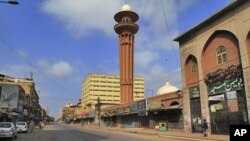A general strike called to protest the ongoing political and ethnic violence in Karachi left Pakistan's largest city mostly deserted on Tuesday.
Karachi's main political party, the Muttahida Qaumi Movement (MQM), called for a "day of mourning" in the southern port city, where nearly 100 people were killed during the past week. MQM says many of its members were killed in the recent violence.
Most businesses, schools, and government offices were closed due to the strike, and traffic was light in Karachi.
Prime Minister Yousuf Raza Gilani traveled to Karachi Monday for talks with government officials in Sindh province. The prime minister said strict action should be taken against those responsible for the violence.
The Sindh province information minister, Sharjeel Menon, said Tuesday that the government will carry out targeted operations in parts of the city. Additional paramilitary forces and police have been deployed to Karachi but the federal army has not yet been called in to restore peace.
Hundreds of people have been killed in recent months in one of the worst waves of unrest in Karachi in years. Many of the killings are blamed on ethnic gangs linked to rival political factions, such as the majority Urdu-speaking MQM and the mostly ethnic Pashtun Awami National Party.
At least 96 people have been killed since August 17, and the Human Rights Commission of Pakistan says 490 people were victims of targeted killings in Karachi in the first half of this year.
Pakistan's economic hub is home about 18 million people. Karachi also has been the scene of sectarian violence between Sunni and Shi'ite Muslims and militant attacks.
Some information for this report was provided by AP.




